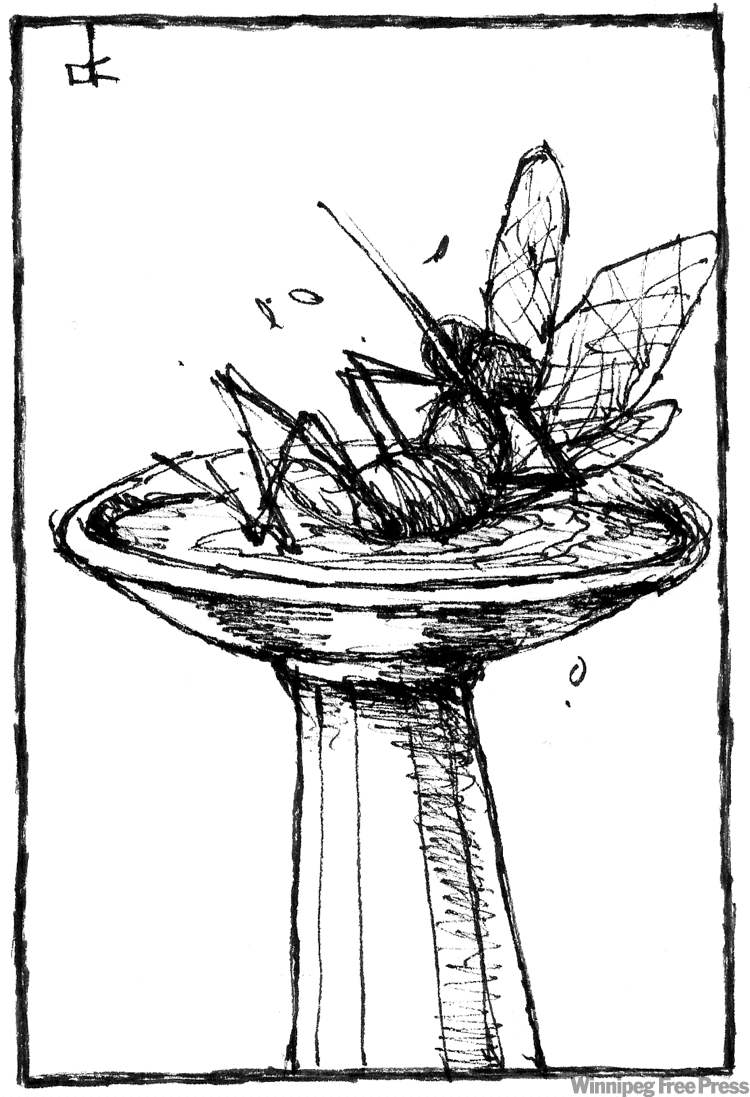Skeeter policy needed
Advertisement
Read this article for free:
or
Already have an account? Log in here »
To continue reading, please subscribe:
Monthly Digital Subscription
$1 per week for 24 weeks*
- Enjoy unlimited reading on winnipegfreepress.com
- Read the E-Edition, our digital replica newspaper
- Access News Break, our award-winning app
- Play interactive puzzles
*Billed as $4.00 plus GST every four weeks. After 24 weeks, price increases to the regular rate of $19.00 plus GST every four weeks. Offer available to new and qualified returning subscribers only. Cancel any time.
Monthly Digital Subscription
$4.75/week*
- Enjoy unlimited reading on winnipegfreepress.com
- Read the E-Edition, our digital replica newspaper
- Access News Break, our award-winning app
- Play interactive puzzles
*Billed as $19 plus GST every four weeks. Cancel any time.
To continue reading, please subscribe:
Add Free Press access to your Brandon Sun subscription for only an additional
$1 for the first 4 weeks*
*Your next subscription payment will increase by $1.00 and you will be charged $16.99 plus GST for four weeks. After four weeks, your payment will increase to $23.99 plus GST every four weeks.
Read unlimited articles for free today:
or
Already have an account? Log in here »
Hey there, time traveller!
This article was published 23/06/2010 (5587 days ago), so information in it may no longer be current.
The only issue guaranteed to trump taxes, roads and crime on the public’s anger index is when swarms of mosquitoes make it impossible to step outside without full body armour. But even though the menace emerges on a regular basis, the city and the province have failed to treat it like a major public policy problem.
The usual response has been to wait until mosquitoes become a nuisance, and then to begin fogging operations, sparking howls of anger from chemical opponents and equally large outbursts from those who want adult mosquitoes terminated on a regular, ongoing basis with whatever weapon happens to be handy.
Mayor Sam Katz is tabling a motion today that calls for a re-evaluation of the city’s mosquito-control policy, particularly the question of what conditions must be met before the city can legally begin fogging. At the same time, Coun. Gord Steeves wants to review the use of buffer zones, which are regulated by the province.

Rather than responding in such a piecemeal fashion, however, the city should encourage the province to conduct a full review of mosquito abatement policies in Winnipeg and elsewhere in Manitoba.
There are many questions to be answered. Is malathion, for example, still a valid choice for fogging or should the province urge the federal government to approve the use of synthetic chemicals that are popular in the United States? In fact, many cities south of the border are fogging adult mosquitoes without the divisive debates occurring here.
The City of Grand Forks, for example, uses the chemical permethrin to kill adult mosquitoes and it even conducts aerial campaigns, but there is no outcry, partly because the city has done a good job communicating with the public.
Permethrin, by the way, is used on the uniforms of Canadian soldiers in Afghanistan to control biting insects, even though it is not licensed for use to kill mosquitoes in Canada. The uniforms have to be turned over to military authorities when the soldiers return home.
Winnipeg also needs to learn about best practices in other communities. Edmonton stopped fogging about 20 years ago. It concentrates on larviciding and on an extensive program to fill in low-lying areas. In fact, Winnipeg may be the only major Canadian city that regularly fogs for mosquitoes, but there doesn’t seem to be good information on who fogs and who doesn’t.
National and regional mosquito-control associations in the United States assist communities with research, education, training and other services, but there’s nothing like them in Canada. The advantage of regional associations is that they are all dealing with the same habitat, while the national organization serves as a clearing house for new ideas and initiatives.
The City of Winnipeg and the province should also be supporting research on the problem. Biologist Steve Whyard of the University of Manitoba is studying the feasibility of sterilizing mosquitoes through mass production of genetically altered insects. According to Prof. Whyard, early testing in Africa and other places shows it works well in small areas and might be successful in cities.
The question of whether to spray or not is easily resolved when West Nile virus is detected, which triggers immediate and sustained fogging without buffer zones. In those cases, the concerns of asthma sufferers and others with respiratory issues are swept aside for the public good.
But when mosquitoes are merely a nuisance, whose rights should prevail? Right now, the city tries to balance the interests of those who want to enjoy summer with the concerns of those who claim fogging is a direct threat to their health.
The current approach, however, has divided the city, as it does every year when mosquitoes are a problem. It’s time to declare mosquito control a provincial priority and get on with the job of developing real solutions that everyone will understand and accept.




